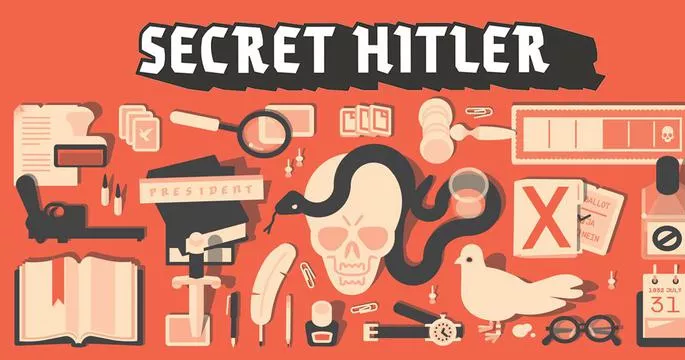Secret Hitler is a social deduction game developed by Goat, Wolf, & Cabbage LLC. Like Overcooked, Secret Hitler doesn’t necessarily have one set audience; the only requirement is that players understand the difference between liberalism and fascism, and that players understand the somewhat convoluted set of rules, which means that the ideal audience is probably adults at social gatherings – families, coworkers, etc. It is primarily played as a board game, but it also exists online (which seems to be created by a fan unrelated to the original developers). I played with my friends using the online version.
Secret Hitler is very similar to Mafia, but with more opportunities for tension and conflict. By engineering these opportunities for social deception, Secret Hitler creates unpredictable, fast-paced gameplay – all the best parts of Mafia, amplified.
In Mafia, players must mask as villagers or accuse other villagers of their own volition (barring modifications in gameplay). In Secret Hitler, however, the mechanism of passing liberal or fascist policies every round encourages players to deceive each other. As a President, you can lie about what kinds of cards you are given. As a Chancellor, if you are daring enough, you can lie about the kinds of cards that the President gave you. The very act of passing a policy reflects something about your allegiance: are you a Liberal just because you passed a Liberal card? Or, if you passed a Fascist policy, are you an actual Fascist or just an unwilling Liberal? Since you are more likely to get Fascist cards over Liberal cards (11 Fascist cards to 6 Liberal cards), even innocent Liberals can be suspected if they play a Fascist card unwillingly. This mechanism generates mistrust and chaos, one of the central aesthetic goals of social deception.
When I played, we didn’t think of the possibility of lying as a Chancellor – the stakes of lying seemed too high when another player who might not be on your team could suspect you and point you out. This is a possible flaw of the game, although we might also be inexperienced players. I felt that, even as a Fascist, I had to pass Liberal policies to avoid suspicion. Often, if players are not ballsy enough, the Liberals just end up winning slowly anyway.
In Mafia, the only way to win is through elimination. Mafia have a low chance of actually winning because they have to kill everyone else; Mafia have an inherent disadvantage of being outnumbered. Meanwhile, villagers have to almost at random vote off the Mafia, with no concrete information to go on. Moreover, as games drag on, and more and more people are voted out, people become disengaged. But in Secret Hitler, there are multiple ways to win for both teams: one, by passing all the policies of their political affiliation, or by killing/electing Hitler. The second method of winning makes the game feel less predictable, and each decision higher stakes. When I played as a Liberal, for example, and accidentally elected Hitler to be chancellor, I still felt pleased with the discovery – the surprise – even though I had lost. I was more engaged as a Liberal than I would have been as a villager in Mafia, where no player ever have a direct say in what happens. There is also less of a chance to be voted off – and more design in the information that being voted off provides. Killing is less random in Secret Hitler; it betrays more of someone’s personal motivations, which means that it encourages more conflict, and feels less like, whelp, I’m dead now.
Overall, Secret Hitler is a cleverly designed, unpredictable, and well-balanced game that provides a low barrier of entry to lying. Even players who are too timid in Mafia to fight for themselves have an opportunity to hone their social deception skills in this game. I think it would be worth it to buy the board game version; I think the “hands-on” tactile feel of cards would make the card selection process even more communal and exciting. The online version that I played, because of its crappy UI (no labels, explanations, or walkthroughs), and fewer feedback mechanisms (no dings, sounds, etc.) for when players actually needed to do something, just felt less… satisfying. But I still enjoyed it quite a bit.





